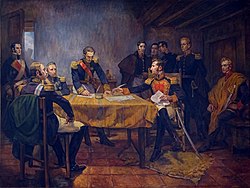Antonio José de Sucre
Antonio José de Sucre y Alcalá (Spanish pronunciation: [anˈtonjo xoˈse ðe ˈsukɾe j alkaˈla] (![]() listen); February 3, 1795 – June 4, 1830), known as the "Gran Mariscal de Ayacucho" (English: ["Grand Marshal of Ayacucho"] Error: {{Lang}}: text has italic markup (help)), was a Venezuelan independence leader. He was the fourth President of Peru and the second President of Bolivia.
listen); February 3, 1795 – June 4, 1830), known as the "Gran Mariscal de Ayacucho" (English: ["Grand Marshal of Ayacucho"] Error: {{Lang}}: text has italic markup (help)), was a Venezuelan independence leader. He was the fourth President of Peru and the second President of Bolivia.
Antonio José de Sucre | |
|---|---|
 Portrait by Martín Tovar y Tovar | |
| 2nd President of Bolivia | |
| In office 29 December 1825 – 18 April 1828 | |
| Preceded by | Simón Bolívar |
| Succeeded by | José María Pérez de Urdininea |
| 4th President of Perú | |
| In office 23 June 1823 – 17 July 1823 | |
| Preceded by | José de la Riva Agüero |
| Succeeded by | José Bernardo de Tagle |
| Personal details | |
| Born | Antonio José de Sucre y Alcalá February 3, 1795 Cumaná, Captaincy General of Venezuela (in present-day Venezuela) |
| Died | June 4, 1830 (aged 35) Outside Pasto, Republic of New Granada (in present-day Arboleda, Colombia) |
| Resting place | Cathedral of Quito |
| Nationality | Venezuelan |
| Spouse(s) | Maríana de Carcelén y Larrea, Marquise of Solanda |
| Children | Teresa Sucre y Carcelén |
| Honorary title | Gran Mariscal de Ayacucho |
| Signature | Antonio José de Sucre's signature |
Sucre was one of Simón Bolívar's closest friends, generals and statesmen. The city of Sucre, Bolivia's capital, is named for him, as is a state of Venezuela and a department of Colombia. The Mariscal Sucre International Airport of Ecuador's capital Quito are also named after him.
Ecuador’s former currency the “Sucre” was also named after him.
Sucre was shot and killed by multiple assassins on June 4, 1830 at the age of 35.[1]
Antonio José De Sucre Media
Surrender at Ayacucho (Daniel Hernández).
Bolivian Independence Act at Casa de la Libertad, Sucre.
Death of Antonio José de Sucre by Arturo Michelena.
Statue in Bogotá
References
- ↑ Monroy, Ramón Rocha (June 5, 2009). "Ultimas cartas de Sucre" (in Spanish). Bolpress.
{{cite web}}: CS1 maint: unrecognized language (link)




